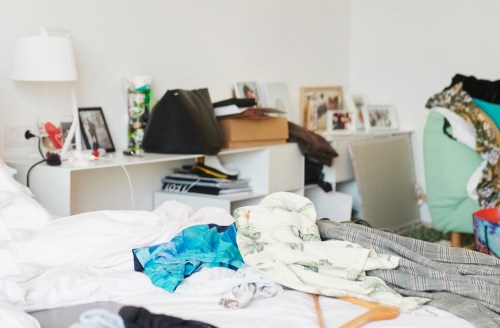In Defense of Living In a State of Disorganized, Cluttered Disarray, According to Science
We know, we know, you shouldn't hold onto things that don't spark joy. But, there are real benefits of being disorganized and cluttered. Learn them here.

I’ve just relocated from a long weekend at my friend’s pristine, expansive apartment with minimalist decor, back to my very own garbage palace. Here, the dirty dishes are skyscraper high, there are nail polish vials and empty water bottles covering the entire surface of the coffee table, and two of my four plants are dead. So, feeling extremely low and needing a fresh dose of classiness, I turned on Breakfast at Tiffany’s…and was instantly reminded that there are real benefits of being disorganized.
Experts in This Article
clinical psychologist, life fulfillment expert, and author of Date Smart, Joy From Fear, and Aging Joyfully
Main character Holly Golightly, of the pearls and LBD fame, has come to personify being (or at least looking) put together. But she’s also someone with a bathtub couch, a phone in her suitcase, and a bottle of perfume in her mailbox. So, clearly, being classy and being messy are not mutually exclusive. In fact, you can be the dorm-room-approved vision of elegance and have a wildly disorganized home—and that’s A-okay. While research skews in favor of high levels of organization connecting to being mentally healthy, what’s also psychologically important is that you feel safe and comfortable.
“While a perfectly clean, bare environment may be appealing to one person, another individual might find that same setting to be unappealing and anxiety-inducing.” —clinical psychologist Carla Marie Manly, PhD
“While a perfectly clean, bare environment may be appealing to one person, another individual might find that same setting to be unappealing and anxiety-inducing,” says clinical psychologist Carla Marie Manly, PhD. “And, while oodles of knickknacks and comfy clutter may feel very soothing to one personality type, another person may feel overwhelmed or anxiously claustrophobic. On a neurobiological level, when we enter the space we call home, we want it to feel soothing, inviting, comfortable, and reassuring—and what it takes to achieve this ideal balance is a matter of personal preference.”
And as many of us hunker down in our homes during these pandemic times, filling space with items to make us happy, we’d be wise to remember Dr. Manly’s advice: personal preference is what’s key to deciphering whether “clutter” or “neat freak” is more optimal for happiness. And for those who lean more toward disarray, worry not; clutter can add to your character, after all. In fact, the benefits of being disorganized reflect that clutter-happy individuals may have a kind of nutty genius energy.
For example, a chaotic desk can mean good news. According to one 2013 study published in Psychological Science, a messy environment encourages out-of-the-box thinking. Participants were asked to fill out questionnaires—some in a clean, orderly office, others in a if-a-tornado-hit-a-Staples office. They were then asked to think up novel uses for a Ping-Pong ball. Those who were working in a messy environment came up with many, many more ideas for said Ping-Pong ball.
In that same study, half of the neat-room participants and half of messy-room participants were asked to choose a vitamin “boost” for a smoothie. Some of the boosts were labeled ‘new’ and others ‘classic.’ Neat-room people were more likely to choose the health boost labeled “classic,” and people in the messy room were more likely to choose the health boost labeled ‘new.’ The conclusion here is that disorganized environments may encourage both out-of-the-box thinking and fun, fresh decisions, as well.
But, just as most things are best done in moderation, so, too, is clutter—especially if you share space with someone else, who may have their own personal preferences. In this case, creating the idea environment can be understood as an ongoing process of collaboration, compromise, and acceptance. “You can then work others in your household to compromise on standards to create a setting that feels comfortable for everyone,” says Dr. Manly. “And, when it comes to maintain a healthy balance, it’s important to pay attention to the big picture rather than letting the little things give way to upset feelings and anxiety. If leaving the dishes undone when you’re extra weary allows you to get an extra half-hour of sleep or 30 extra minutes of snuggle time, the morning mess can be worth it.”
Essentially, there’s no reason to be ashamed if your space is filled with stuff—and stuff that’s often in strange places. There’s also nothing wrong if your situation leans somewhat sterile. What matters is that you decide early on what state of chaos you’re personally most comfortable with.
“Whether it’s slightly messy, bleach-clean, utterly chaotic, or somewhere in-between, it’s important to know what feels best to you,” says Dr. Manly. “This is a necessary first step, as some people either adopt a style by default or employ a style that is unconsciously reactive to a childhood environment. Actually thinking about and choosing one’s own preferred style in a nonjudgmental way can be powerfully affirming and comforting.” And I have to say, intentionally living in a state of Golightly-like disarray does make me feel at home.
Sign Up for Our Daily Newsletter
Get all the latest in wellness, trends, food, fitness, beauty, and more delivered right to your inbox.
Got it, you've been added to our email list.










